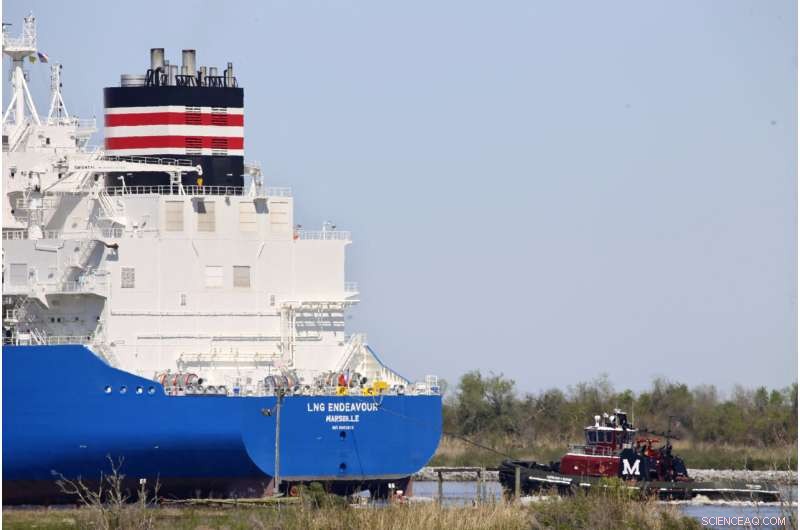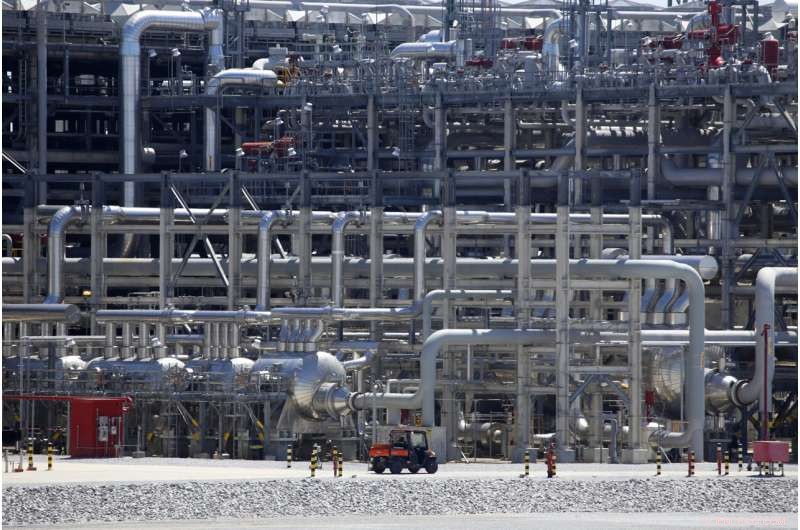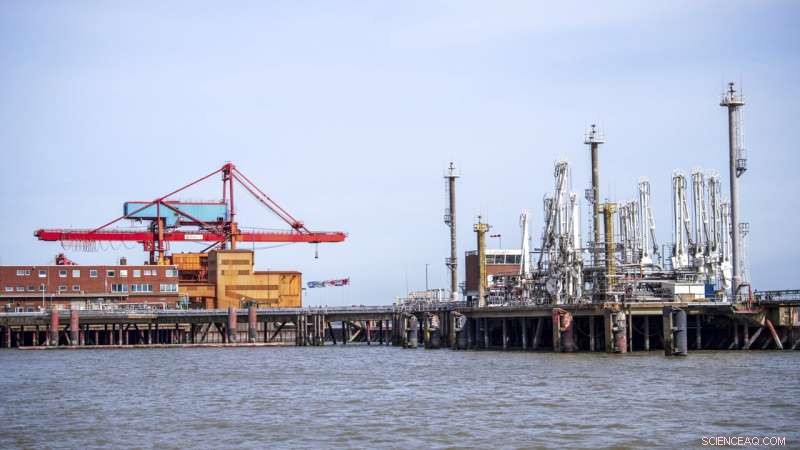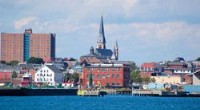Europaplan for flydende gasterminaler vækker klimafrygt

En slæbebåd hjælper med at guide et fransk skib, kendt som LNG Endeavour, gennem Calcasieu-søen nær Hackberry, La., den 31. marts 2022. Ruslands krig mod Ukraine knuste dets forbindelser med Europa, som hurtigt mistede det meste af den naturgas, som Moskva havde. længe forudsat. Nu, hvor vinteren nærmer sig, har europæiske nationer støttet en kortsigtet løsning, der skal begynde inden udgangen af 2022, som har rejst alarmer blandt videnskabsmænd, der frygter de langsigtede konsekvenser for klimaet. Kredit:AP Photo/Martha Irvine, File
Efterhånden som vinteren nærmer sig, har europæiske nationer, desperate efter at erstatte den naturgas, de engang købte fra Rusland, taget en kortsigtet løsning til sig:En serie på omkring 20 flydende terminaler, der ville modtage flydende naturgas fra andre lande og omdanne den til brændstof til opvarmning.
Alligevel har planen, med de første flydende terminaler sat til at levere naturgas ved årets udgang, rejst alarmer blandt forskere, der frygter de langsigtede konsekvenser for miljøet. De advarer om, at disse terminaler vil forevige Europas afhængighed af naturgas, som frigiver klimavarmende metan og kuldioxid, når det produceres, transporteres og brændes.
Nogle videnskabsmænd siger, at de bekymrer sig om, at de flydende terminaler vil ende med at blive en langsigtet leverandør af Europas enorme energibehov, der kan vare år, hvis ikke årtier. En sådan tendens kunne sætte emissionsreduktionsindsatsen tilbage, som eksperter siger, ikke har bevæget sig hurtigt nok til at bremse skaden på det globale miljø.
Meget af den flydende naturgas, eller LNG, som Europa håber at modtage, forventes at komme fra USA. Behovet opstod efter Ruslands invasion af Ukraine knuste dets bånd til Europa og førte til en afskæring af det meste af den naturgas, som Moskva længe havde leveret. Langs den amerikanske golfkyst udvides eksportterminaler, og mange indbyggere er bekymrede over stigningen i boring efter gas og det deraf følgende tab af jord samt ekstreme vejrændringer forbundet med afbrænding af fossile brændstoffer.
"At bygge denne enorme LNG-infrastruktur vil låse verden til fortsat afhængighed af fossile brændstoffer og fortsatte klimaskader i de kommende årtier," sagde John Sterman, en klimaforsker ved Massachusetts Institute of Technology.
Naturgas bidrager væsentligt til klimaforandringerne – både når den forbrændes, bliver til kuldioxid og gennem lækager af metan, en endnu mere potent drivhusgas. Alligevel har europæiske nationer, som i årevis har været førende i at skifte til renere energi, foreslået at bringe mere end 20 flydende LNG-terminaler ind i deres havne for at hjælpe med at kompensere for tabet af Ruslands naturgas.
Terminalerne, som tårner sig op over boliger og strækker sig næsten 1.000 fod (304 meter), kan opbevare omkring 6 milliarder kubikfod (170.000 kubikmeter) LNG og omdanne det til gas til boliger og virksomheder. De kan bygges hurtigere og billigere end onshore-importterminaler, selvom de er dyrere i drift, ifølge International Gas Union.
"Hvert land er nødt til at forberede sig på et scenarie, hvor der kan være et nedskæring i russiske forsyninger," sagde Nikoline Bromander, analytiker hos Rystad Energy. "If you are dependent, you need to have a backup plan."

A flare burns at Venture Global LNG in Cameron, La., on April 21, 2022. Russia’s war against Ukraine shattered its relations with Europe, which soon lost most of the natural gas that Moscow had long provided. Now, as winter nears, European nations have backed a short-term fix set to begin before the end of 2022 that has raised alarms among scientists who fear the long term consequences for the climate.Credit:AP Photo/Martha Irvine, File
Many environmental scientists argue that the money being earmarked for the ships—which cost about $500 million each to build, according to Rystad—would be better spent on rapidly adopting clean-energy or efficiency upgrades that could reduce energy consumption.
Constructing more solar or wind farms, which takes years, wouldn't immediately replace Russian gas. But with adequate funding, Sterman suggested, greater energy efficiencies—in homes, buildings and factories, along with the deployment of wind, solar and other technologies—could vastly reduce Europe's need to replace all the gas it's lost.
Germany, among Europe's strongest advocates for the floating LNG terminals, is expecting five of the ships and has committed roughly 3 billion euros to the effort, according to Global Energy Monitor. Germany has also approved a law to fast-track the terminals' development, suspending the requirement for environmental assessments.
It's a move that troubles environmental groups.
"It's totally obvious," asserted Sascha Müller-Kraenner, CEO of Environmental Action Germany, that "the provisions of the law were developed in close dialogue with the gas industry."
Germany's government and energy industry have defended their embrace of the LNG terminals as an urgent response to the loss of most of the Russian gas they had long received, which they fear Moscow will shut off completely.
"In an exceptional situation such as this, where it's a matter of Germany's gas supply security, it is justified to accelerate the approval process," Germany's energy industry association, BDEW, said in a statement.
Susanne Ungrad, a spokeswoman for Germany's Economy and Energy Ministry, noted that efforts are being made to lower methane emissions in exporting countries like the United States. And she said that in pursuing the construction of LNG terminals, Europe authorities will conduct comprehensive assessments.

A small vehicle drives past a network of piping that makes up pieces of a "train" at Cameron LNG export facility in Hackberry, La., on March 31, 2022. Russia’s war against Ukraine shattered its relations with Europe, which soon lost most of the natural gas that Moscow had long provided. Now, as winter nears, European nations have backed a short-term fix set to begin before the end of 2022 that has raised alarms among scientists who fear the long term consequences for the climate. Kredit:AP Photo/Martha Irvine, File
Greig Aitken, an analyst at Global Energy Monitor, noted that a terminal that's set to open near Gdansk, Poland, has signed contracts with American LNG suppliers that extend well past 2030. That could make it problematic for the European Union to meet its goal of reducing greenhouse gas emissions by at least 55% by 2030.
Italy, Greece, France, the Netherlands, Croatia, Estonia, Finland, Latvia, Slovenia and the U.K. all have one or more floating LNG terminals planned, according to Rystad Energy.
In some cases, proponents argue, the ships could aid the environmental cause. They note, for example, that as Russian gas supplies have dwindled, communities in Germany and elsewhere have been burning coal, which typically produces more emissions than natural gas. Increasing the supply of natural gas would make this less necessary.
Still, methane can frequently leak along the natural gas supply chain. So in some cases, the net climate effect of burning natural gas may be no better than coal.
The U.N. Intergovernmental Panel on Climate Change has warned that continuing to use the fossil fuel infrastructure already in place would cause global warming to exceed 1.5 degrees Celsius (2.7 Fahrenheit). At that level, heat would be expected to worsen the flash floods, extreme heat, intense hurricanes and longer-burning wildfires that have resulted from climate change and have cost lives.
"It is a little disheartening to see Europe, which has been the seat of so much energy and action and bold emissions targets, being home to this particular way with doubling down on fossil fuel infrastructure," said Kim Cobb, a climate scientist at Brown University.
In the United States, the largest export market for Europe-bound LNG, three new export terminals are under construction. Eleven additional terminals and four expansions are in the planning stages. Some export terminals that had struggled to attract financing are now seeing more investment and interest, said Ira Joseph, a longtime energy analyst.
"What you've seen happen over the last two months—they're signing up sales and purchase agreements, right and left," Joseph said.

The area in front of the Stade Industrial Park is part of the future port expansion for the planned import terminal for liquefied natural gas (LNG) in Stade, Germany, on April 2022. Russia’s war against Ukraine shattered its relations with Europe, which soon lost most of the natural gas that Moscow had long provided. Now, as winter nears, European nations have backed a short-term fix set to begin before the end of 2022 that has raised alarms among scientists who fear the long term consequences for the climate. Credit:Sina Schuldt/dpa via AP, File
Rio Grande LNG, an export terminal proposed by Next Decade in Brownsville, Texas, for example, appeared to stall last year in the face of environmental protests. But this spring, a French company, Engie, and several clients in Asia signed long-term contracts to buy LNG from the terminal. Now, Next Decade says it's likely to obtain all the financing it needs.
Europe's gas scarcity has escalated global LNG prices, leading buyers in China and elsewhere to sign long-term contracts with suppliers in the United States. American LNG exports will likely grow by 10 million tons over the next year, said Bromander, the Rystad analyst.
The floating LNG ships have been billed as a short-term solution to keep gas flowing for a few years while cleaner energy sources like wind and solar are built up. But critics say it's unlikely that a ship built to last decades would permanently halt operations after a few years.
Once the floating terminals are built, they can be used anywhere in the world. So if European nations no longer want floating LNG terminals as they transition to cleaner energy, the ships could sail off to another port, essentially locking in the use of natural gas for decades.
And in some cases, particularly in Germany, some of the proposed floating terminals appear to be paving the way for on-shore terminals that would be built to last 30 or 40 years—well past the point that nations should be burning fossil fuels, environmental groups say.
"After the war is resolved and, as we all hope, peace is restored, are they really going to say, 'Oh, let's take it to the scrap yard?,'" Sterman asked. "They're not going to do that." + Udforsk yderligere
EU decision on natural gas could threaten climate progress
© 2022 The Associated Press. Alle rettigheder forbeholdes. Dette materiale må ikke offentliggøres, udsendes, omskrives eller videredistribueres uden tilladelse.
 Varme artikler
Varme artikler
-
 At fjerne tekstilspild kræver nye måder at tænke påKredit:Borås Universitet Meget materiale går til spilde, når der produceres tøj; at reducere dette spild kræver nye måder at tænke på. Systemet blev opbygget i en tid, hvor vi troede, at jordens r
At fjerne tekstilspild kræver nye måder at tænke påKredit:Borås Universitet Meget materiale går til spilde, når der produceres tøj; at reducere dette spild kræver nye måder at tænke på. Systemet blev opbygget i en tid, hvor vi troede, at jordens r -
 Havoverfladetemperaturen har stor indflydelse på korallernes overlevelseEn bleget koral på Hawaii. Uden hurtig indgriben, koralrev vil fortsætte med at nedbrydes, resulterer i det, der kan være det første menneskeskabte tab af et helt biom. Kredit:Greg Asner Globale g
Havoverfladetemperaturen har stor indflydelse på korallernes overlevelseEn bleget koral på Hawaii. Uden hurtig indgriben, koralrev vil fortsætte med at nedbrydes, resulterer i det, der kan være det første menneskeskabte tab af et helt biom. Kredit:Greg Asner Globale g -
 Top 5 amerikanske byer til at bygge et solhusHvis Portland, Maine kan dyrke soldrevne hjem, hvad kan solrigere byer gøre? © iStockphoto.com/rossandgaffney Du skulle ikke tro, at der var noget anderledes ved William og Deborah Lords hus i Portla
Top 5 amerikanske byer til at bygge et solhusHvis Portland, Maine kan dyrke soldrevne hjem, hvad kan solrigere byer gøre? © iStockphoto.com/rossandgaffney Du skulle ikke tro, at der var noget anderledes ved William og Deborah Lords hus i Portla -
 Eksperter diskuterer udfordringer og muligheder i forbindelse med bortskaffelse af affaldKredit:CC0 Public Domain Affald er ikke, hvad det plejede at være. Siden Kina stort set lukkede døren for importeret affald sidste år, omkostningerne til genbrug er steget betydeligt, og programme
Eksperter diskuterer udfordringer og muligheder i forbindelse med bortskaffelse af affaldKredit:CC0 Public Domain Affald er ikke, hvad det plejede at være. Siden Kina stort set lukkede døren for importeret affald sidste år, omkostningerne til genbrug er steget betydeligt, og programme
- Hvordan man forstår flowcytometriresultater
- Geometristyret konstruktion af det tidligste kendte tempel, bygget 6, 000 år før Stonehenge
- En støvet atmosfære forårsagede ekstrem global afkøling
- Dyrekollektiver som myrer bør bevæge sig gennem deres miljø som kyndige gamblere
- En seks-årig søgning i det ydre solsystem viser 461 nye objekter (men ingen Planet 9)
- Studerende designer 3-D-printet optisk kortlægningssystem


